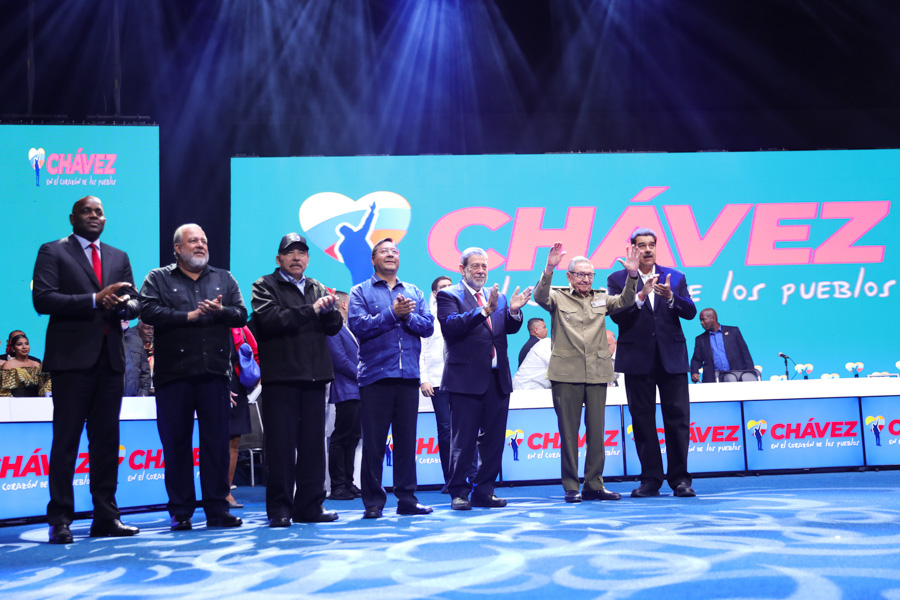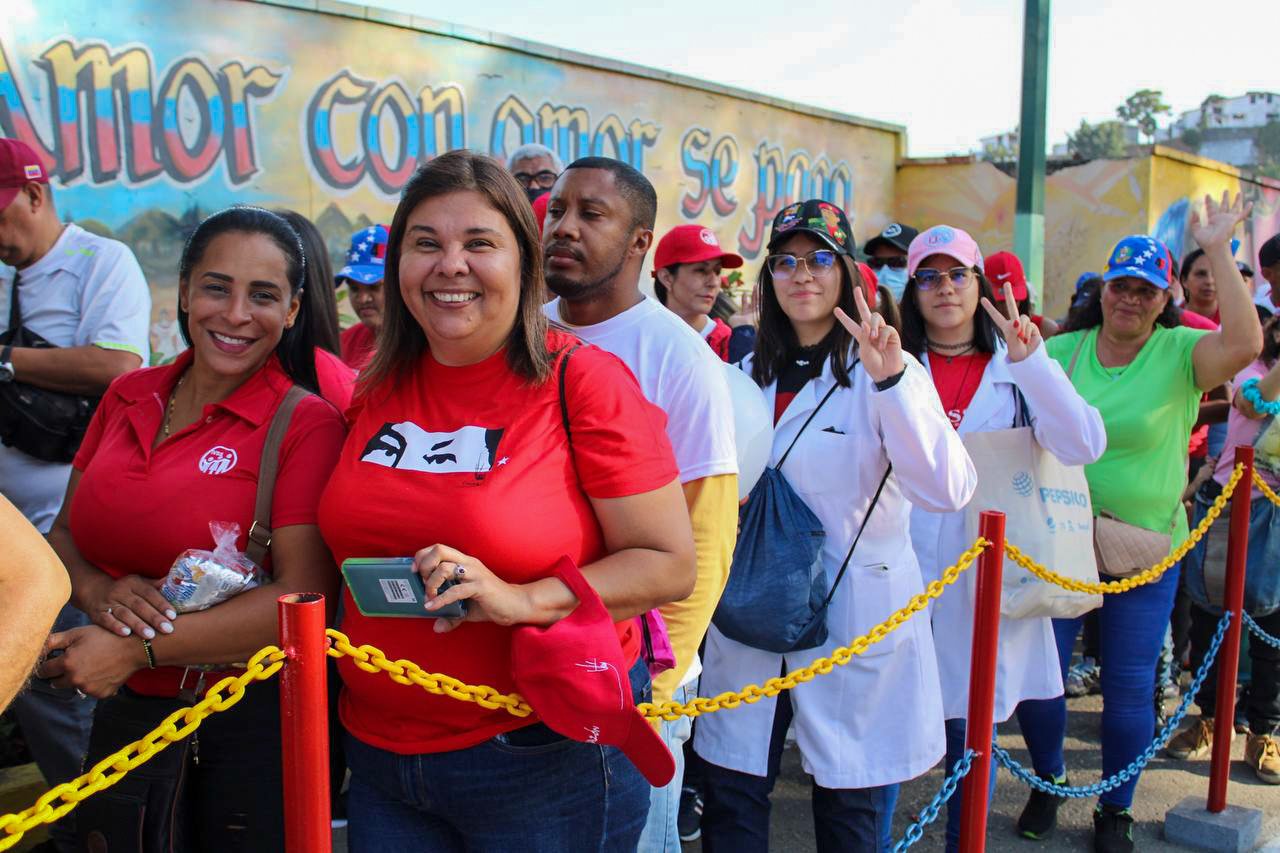www.aljazeerah.info
News, March 2023
Archives
Mission & Name
Conflict Terminology
Editorials
Gaza Holocaust
Gulf War
Isdood
Islam
News
News Photos
Opinion Editorials
US Foreign Policy (Dr. El-Najjar's Articles)
www.aljazeerah.info
|
Editorial Note: The following news reports are summaries from original sources. They may also include corrections of Arabic names and political terminology. Comments are in parentheses. |
Latin America Commemorates the Life and Legacy of Hugo Chavez
March 8, 2023
 |
 |
|
Latin American leaders gather in Caracas, to commemorate the legacy of Hugo Chavez, March 7, 2023 |
Venezuelans gather in Caracas, to commemorate the legacy of Hugo Chavez, March 7, 2023 |
Latin America Commemorates the Life and Legacy of Hugo Chávez
Political figures gathered in Caracas to remember and celebrate the impact of Hugo Chávez on the occasion of the 10-year anniversary of his death.
By José Luis Granados Ceja
Mexico City, Mexico, March 7, 2023 (venezuelanalysis.com) –
Dozens of world leaders, intellectuals, and solidarity activists descended on Caracas last weekend to celebrate the life and impact of former Venezuelan President Hugo Chávez.
The “World Meeting on the Relevance of the Bolivarian Thought of Hugo Chávez” gathered more than 140 international guests from 55 countries who took part in forums, conferences, and talks about Chávez's legacy on the occasion of the 10-year anniversary of his death on March 5, 2013.
The gathering counted on the participation of political leaders such as Prime Minister of Saint Vincent and the Grenadines Ralph Gonsalves; Nicaraguan President Daniel Ortega; and Bolivian President Lucho Arce.
Also in attendance were former presidents such as Cuba’s Raúl Castro, Honduras’ Manuel Zelaya, Ecuador’s Rafael Correa, and Bolivia’s Evo Morales.
“The life of Hugo Chavez can only be explained in his devotion and consecration to his people,” said Correa.
Also in attendance were figures from social movements throughout the continent, including the Landless Peasant Movement’s João Pedro Stedile from Brazil and Claudia De La Cruz from The People’s Forum in the US. Among the public intellectuals who took part were Atilio Borón, Fernando Buen Abad and Ignacio Ramonet.
The event was closed Sunday with a speech from Venezuelan President Nicolás Maduro.
“[Chávez] has always been present in these ten years; there has been a permanent presence of his ideal, his revolutionary drive and his sworn commitment to advance in the construction of a free, independent, sovereign, socialist homeland," said Maduro.
Latin America Commemorates the Life and Legacy of Hugo Chávez | Venezuelanalysis.com
***
Hugo Chávez and the Last Solar Eclipse of the 20th Century
VA writer Andreína Chávez looks back at Hugo Chávez's tenure and the major progress it represented for Venezuela.
Venezuelanalysis.com Mar 5th 2023
I’ve discovered the secret to time travel. But It involves no machines. Instead, it’s a reminiscing phenomenon in which you can return to the past through memory, books, movies and music, but watching it from the perspective of someone who has already gone through it, thus rediscovering history.
My reminiscing journey has focused on the 1990s, the last decade of “the lost century” when Venezuela was desperate to leave behind neocolonialism and false democracies, opening the path for the century of hope, social justice, collective awakening, and rebirth. No other year encapsulates all that better than 1998.
I have two specific memories from 1998 engraved in my brain. The first one is so vivid that sometimes I feel I could step right into it and live it all again: the last solar eclipse of the twentieth century, which occurred on February 26 and my small neighborhood in the country’s devilishly hot western Zulia state had a privileged view.
That day we were the center of the universe. The event was broadcast on national television and scientists and astronomers from around the world came to witness the spectacle. School was suspended, shops closed and people worked until noon. The streets were sizzling with excitement and we used anything we could find to watch the sun and the moon become one, from 3D film cardboard glasses to welding masks and even X-ray plaques.
The eclipse lasted around four hours and during the final phase, we were engulfed in pitch darkness while the temperature dropped unnaturally for a region where sunlight is always streaming and laying on everything like melted brass. It was as if time had stopped, like when the day is hovering on the edge of becoming.
As I watched this half-hypnotized standing on the sidewalk with my family, I heard a neighbor joking that it would be nice to have several eclipses and enjoy the cool breeze more often, to which somebody else answered that the sun was not to blame for our scorching existence: “It’s all that damn oil we have underneath, it heats up everything above!”
I think this was the first time I became aware of living in an oil-producing region and from that moment on I would always look down at my feet and imagine a burbling black sea. Whether the oil (and not the sun) was really to blame for the heat or not, the truth is we did have massive amounts of the so-called “black gold,” attracting modern-day pirates to our land.
Zulia was in fact where Venezuela’s oil industry was born back in 1914 when foreign corporations began digging wells and becoming the new “Spanish colonizers.” They went on to exploit land and workers, turning the country into the world’s leading oil exporter, but keeping the profits to themselves and the local elite, while most of the Venezuelan population lacked basic human rights.
In 1936, the country’s first anti-imperialist strike broke out, led by oil workers that demanded sovereignty over our resources and dignified lives, but the protest was squashed as many others would. This continued even after the industry was formally nationalized in 1976.
There’s an Alí Primera song from 1978 that perfectly describes this historical theft: “Haven't you walked through an oil field? Don't you see that they take away what belongs to our land, leaving us with misery and workers' sweat? In Venezuelan territory, Yankee imperialism does whatever it wants.”
Back in 1998, the year I time-traveled to rewatch the solar eclipse, the privatization of the oil industry was in full swing, non-oil sectors were deeply underdeveloped and the country had 50% and 62.1% of poverty and extreme poverty rates. Yet to this day, corporate journalists like to exercise editorial authority over our history and praise our “once prosperous nation.”
Taking into consideration everything I describe above, is there any doubt that Hugo Chávez, with his emancipatory and antiimperialist political project, won the 1998 presidential election with overwhelming popular support and that his first task was taking back control of the oil sector to pour those resources into our people?
Yes, Chávez's electoral win on December 6, 1998, is the most important memory I or anyone has of that year. A new era had arrived and it could be felt in every corner of the country, even in my small neighborhood, where the occasional eclipse had been the only thing that shook us from our slumber.
Despite the media underlining his military background and failed 1992 rebellion, nobody was afraid of “El Comandante.” His victory was celebrated in the streets as the materialization of decades of popular struggle to exit the neoliberal project and enter a Bolivarian revolutionary movement with a sovereign political and economic model.
With his arrival, Chávez broke 40 years of a corrupt system and established a participatory and protagonistic democracy that went beyond electoral processes. This has allowed for people to take power by organizing for social, economic, political and educational purposes. Today, plenty of popular organizations self-govern over their land, resources and production.
Driven by his desire to build another society where the basic aspects of human life are not commodified, the revolutionary leader launched a myriad of economic and social policies to democratize healthcare, food, housing, and access to technology, sports, and even culture. The renowned social mission were at the heart of this battle.
For example, Mission Robinson eradicated illiteracy in 2005, Mission Barrio Adentro brought doctors and free medicine to poor neighborhoods while the Great Housing Mission has built over 4,4 million houses for working-class families since 2011. By 2012, poverty was cut in half while extreme poverty dropped by more than two-thirds.
The funding of these programs came from the recaptured oil wealth after Chávez launched the Hydrocarbon Law in 2001 and re-nationalized the industry in 2007, finally ending 100 years of foreign control over our most abundant resource.
Truth is, our problems were not all magically solved with Chávez but we had the best social indicators in history and more importantly, we were building a future, casting away old colonial models to craft something new.
Amisdt advances and setbacks, the Bolivarian Revolution was and continues to be the driving force behind a continental anti-imperialist struggle while leading the way into the uncharted path of twenty-first-century socialism in order to construct a more just and egalitarian society.
Ten years after Chávez passing on March 5, 2013, whenever someone asks me about the most important aspect of his legacy, the answer comes as easily as the memory of the solar eclipse: recovering our dignity as a sovereign nation.
Hugo Chávez and the Last Solar Eclipse of the 20th Century | Venezuelanalysis.com
***
Fair Use Notice
This site contains copyrighted material the
use of which has not always been specifically authorized by the copyright
owner. We are making such material available in our efforts to advance
understanding of environmental, political, human rights, economic,
democracy, scientific, and social justice issues, etc. We believe this
constitutes a 'fair use' of any such copyrighted material as provided for
in section 107 of the US Copyright Law. In accordance with Title 17 U.S.C.
Section 107, the material on this site is
distributed without profit to those
who have expressed a prior interest in receiving the included information
for research and educational purposes. For more information go to: http://www.law.cornell.edu/uscode/17/107.shtml.
If you wish to use copyrighted material from this site for purposes of
your own that go beyond 'fair use', you must obtain permission from the
copyright owner.
|
|
|
|
||
|
||||||


